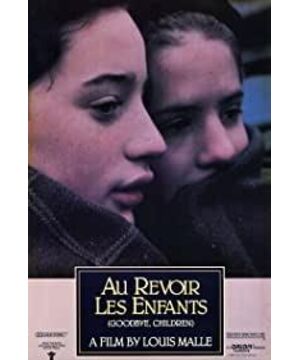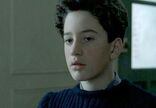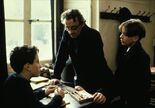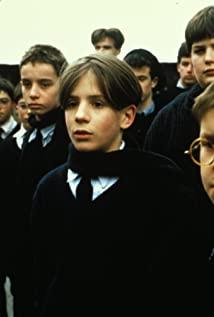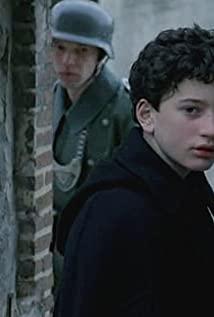I really want to watch a movie about World War II and the Jews every once in a while. The last one was "Hidden Love".
I often talk about children's movies and talk about the lives of children. In this kind of movies There is another category, which usually talks about the innocent friendship between two boys, sometimes it is passionate and sublimated into love. To quote a line from He Yunshi's "Rolls Royce": "Being a close friend will probably end up with love." Generally, in this type of subject matter, one of the two boys is always weak, either Jewish, or sick, or It was kidnapped or molested by an adult, and the other party gave him unlimited love in his own way. The reference films are as follows: "Crocodile Sneakers", "Bad Education", "I'm Not Afraid of You", "The Boy in Striped Pajamas", and of course today's French film "Goodbye, Children". I quite like the first two of the above movies and this one.
This article is not a film review, I just want to talk about a few symbolic meanings in it.
The first is the traitor cook. He was taken in by the school from a humble background, but was expelled for engaging in black market trading. Therefore, he defected to the Germans and exposed the principal's hiding of Jews, which brought destruction to the school. What's interesting here is that the school is basically a church school, and there are often passages of Scripture, which echoes Judas under Christ in the Bible. Because he was not good at learning skills, the information just now turned out: "Judas Isgalliott is a lower-class liquor dealer with a strong rebellious mentality." This point is consistent with that character. Judas is the prototype of the cook, but Judas exposes that Jesus was to save the Jews. In this film, he killed the Jews. This is quite interesting.
Secondly, the school will show Chaplin's film one day. According to my superficial knowledge, I know that Chaplin is on Hitler’s blacklist, so being able to show his movie reflects the school’s defiant spirit. Of course, other than that. Embodied.
At that time, it was a clip of "Immigration", and the screen was on "Immigration" for almost several minutes. The selection of this paragraph is also very meaningful:
1. Chaplin and a group of immigrants were on a boat bound for the United States, shaking around, everyone took turns to eat, which symbolized that in World War II, the world was ups and downs, the school was the sea, the school was the ship, and the children were the passengers on the ship. As the world turned upside down, there was not enough food to share. In the movie, the children laughed very happily at this scene, but in fact the story happened to themselves, it was impossible to laugh, although Chaplin might have been filming this. I didn't expect to be quoted in this way by posterity, but I still have to sigh his greatness.
2. Chaplin met his true love on the boat, a certain pretty girl. This implies that the encounter between the two male protagonists in the film, although the war is tense and life is difficult, they still encounter true friendship and sincere feelings in their lives. This kind of life experience is also a bit of sweetness in the sea of bitterness.
3. The "Immigration" movie features the Statue of Liberty. The immigrants saw the United States and saw hope. The same was true of World War II. The movie also mentioned that they were always talking about when the United States and Britain could attack. The United States is the hope of victory in the war, and the arrival of the American army also represents freedom.
4. In the end, Chaplin and some immigrants were basically quarantined when they were about to go ashore. The movie was probably to check for infectious diseases, but it implied that the school was closed by the Germans and several Jews who were hiding were arrested. When they came out to be isolated, everyone was named one by one. When the movie was in the scene of "Immigration", a few children couldn't laugh. . . . . .
The hints I have seen have been analyzed, and I will talk about some of the details I have seen scattered below.
The priest said to the children: "If the enemy is hungry, give him food; if the enemy is thirsty, give him a drink." I first thought of Yang Guo unconsciously. Recently I was listening to the second part of the "Shen Diao" trilogy. "The Legend of Heroes", and then I took out the bible at home. The hardback is gone. Now there is only a simplified version, which is not too thin. I always hope that I can read this book carefully, but I always do. Can't stand it. . . Hey. . . . . . .
When the Germans arrested the Jews, the nun betrayed them, and none of the male protagonists betrayed them. The nun is a representative of God, but she has done something that goes against the will of God. The description of human nature here is very good. Although it is mentioned in a stroke like "Titanic", it is very impressive. Does it mean that the more a person grows up, the heavier the sin in his heart. . . . . .
In conclusion, I have really seen many stories about Jews and Germans during World War II. Many of them were mediocre, but there were also many touching and tear-jerking. It’s weird that watching these movies makes it difficult for people to hate the crimes of the Germans again, at least not to be filled with anger, but to let us pay attention to the true feelings between people and praise the beauty of human nature. The ugly flogging of human nature, and the helplessness to human nature itself. China was a big country in World War II, but it was still unable to produce any awesome films, either showing how ugly the enemy is or how brave we are, and seldom explored the things behind human nature. Gritting his teeth and letting people like Ai Yuejin continue to orgasm would be a very failure. It is meaningless to compete with the past. We are powerless to change. Retaliation will only bring a new round of hatred and harm. War is temporary and human nature is eternal.
I believe that if there are good scripts, good directors and good actors, and without this shit censorship system, it is not impossible for China to produce good movies during World War II, but these can only make me feel sick now.
View more about Au Revoir les Enfants reviews


